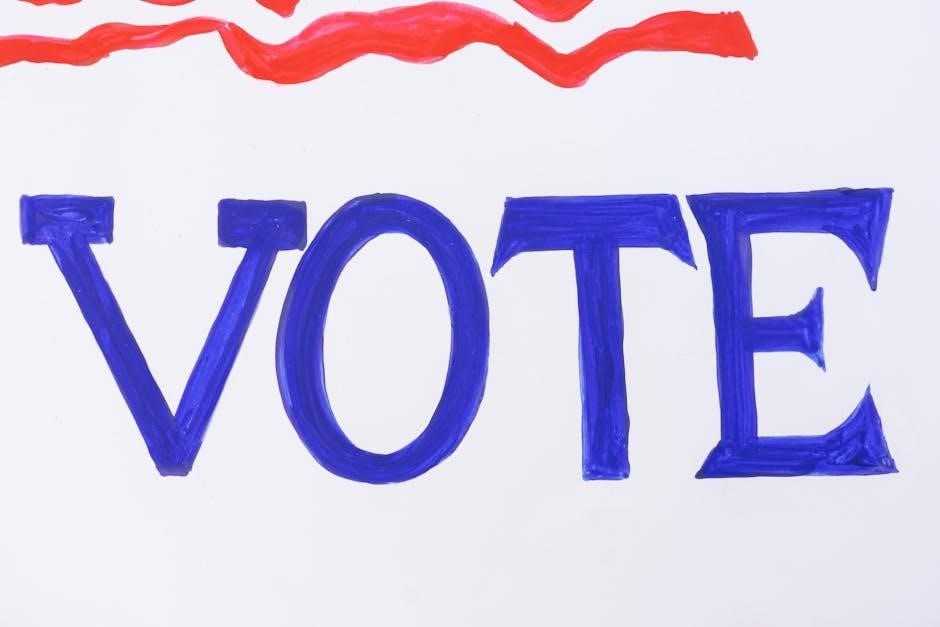Understanding voting rights is crucial for civic engagement. The iCivics Answer Key PDF provides insights into historical challenges and educational tools for informed participation.
Overview of Voting Rights in the United States
Voting rights in the U.S. have evolved significantly‚ shaped by historical struggles and legislative milestones. The iCivics Answer Key PDF highlights key challenges‚ such as voter suppression and access barriers‚ while emphasizing the importance of civic education in fostering informed participation. It serves as a valuable resource for understanding the complexities of voting rights‚ offering insights into past and present obstacles and the ongoing efforts to ensure equitable access to the ballot box for all citizens.
Importance of the iCivics Answer Key PDF
The iCivics Answer Key PDF is an essential educational tool for understanding voting rights. It provides comprehensive insights into historical and modern challenges‚ offering a framework for civic education. By addressing key concepts and case studies‚ it empowers students and citizens to engage critically with voting rights issues. This resource is particularly valuable for fostering informed participation and promoting equitable access to the democratic process‚ making it a cornerstone for civic literacy and active citizenship in the United States.
The Evolution of Voting Rights in America
Voting rights in America have undergone significant transformation‚ from the Founding Fathers to modern times‚ shaped by landmark legislation and social movements‚ ensuring broader inclusivity.
Historical Context: From the Founding Fathers to the Present
Voting rights in America evolved from limited suffrage at the nation’s founding to broader inclusion. Initially‚ voting was restricted to white‚ landowning men. The Civil War Amendments abolished slavery and extended citizenship‚ while the 19th Amendment granted women the right to vote. The Civil Rights Movement of the 1960s further expanded voting rights through landmark legislation like the Voting Rights Act. Today‚ ongoing debates about voter access and equity continue to shape the democratic process‚ reflecting a complex journey toward universal suffrage.
Key Legislation: The Civil War Amendments and Beyond
The Civil War Amendments laid the groundwork for voting rights expansion. The 13th Amendment abolished slavery‚ while the 14th and 15th Amendments established citizenship and protected voting rights for African American men. The 19th Amendment later secured women’s suffrage‚ and the Voting Rights Act of 1965 dismantled racial barriers. The 26th Amendment lowered the voting age to 18‚ ensuring younger citizens could participate. These landmark laws collectively shaped the legal framework for voting rights‚ addressing historical inequities and fostering a more inclusive democracy.

Challenges and Barriers to Voting Rights
Voting rights face obstacles like voter suppression‚ restrictive ID laws‚ and gerrymandering. These barriers disproportionately affect marginalized communities‚ undermining equal access to the ballot box.
Voter Suppression and Modern-Day Obstacles
Voter suppression remains a significant challenge‚ often targeting marginalized communities. Tactics include restrictive voter ID laws‚ voter roll purges‚ and gerrymandering. These practices disproportionately affect communities of color and low-income individuals‚ limiting their access to the ballot box. Modern-day obstacles also include misinformation campaigns and polling place closures‚ further discouraging voter participation. Addressing these issues is critical to ensuring fair and equitable elections‚ as highlighted in the iCivics Answer Key PDF‚ which emphasizes civic education as a tool for empowerment.
The Impact of Voter ID Laws and Gerrymandering
Voter ID laws and gerrymandering significantly impact voting rights‚ creating barriers for marginalized communities. Strict ID requirements disproportionately affect low-income and minority voters‚ while gerrymandered districts dilute their political power. These practices often result in reduced voter turnout and unrepresentative governance. The iCivics Answer Key PDF underscores the importance of understanding these challenges to advocate for equitable voting systems and protect democratic integrity.

Technology and Voting Rights
Technology plays a dual role in voting rights‚ expanding access through electronic systems while introducing challenges like cybersecurity threats. Balancing innovation with security is essential for fair elections.
The Role of Technology in Expanding Voter Access
Technology has revolutionized voter access by introducing online registration‚ early voting systems‚ and accessible ballots. Tools like the iCivics Answer Key PDF educate citizens on voting rights‚ fostering informed participation. However‚ cybersecurity threats pose challenges‚ requiring robust safeguards to maintain election integrity. As technology advances‚ balancing innovation with security remains crucial to ensure equitable and secure voting processes for all eligible citizens.
Addressing Cybersecurity Threats in Elections
Cybersecurity threats pose significant risks to election integrity‚ including hacking‚ disinformation‚ and system breaches. These risks can undermine public trust and compromise voter data. To address these challenges‚ robust security measures such as encryption‚ audits‚ and paper trails are essential. Additionally‚ educating voters and election officials about cybersecurity best practices is critical. The iCivics Answer Key PDF highlights the importance of safeguarding elections while promoting civic education to ensure secure and fair voting processes.
Collaboration between governments and tech experts is vital to stay ahead of evolving threats and protect democratic systems.
Educating Citizens on Voting Rights
Civic education empowers citizens with knowledge of their rights and responsibilities‚ fostering informed decisions. The iCivics Answer Key PDF serves as a valuable resource‚ enhancing understanding and encouraging active engagement in the democratic process.
The Role of Civic Education in Voter Participation
Civic education plays a pivotal role in fostering voter participation by equipping citizens with the knowledge and skills necessary to engage in the democratic process. It teaches individuals about their rights‚ the electoral system‚ and the importance of their voice in shaping policies. By cultivating critical thinking and civic literacy‚ education empowers people to make informed decisions and actively contribute to their communities. This foundational understanding is essential for addressing historical and modern barriers to voting‚ ensuring a more inclusive and representative democracy.

Moreover‚ civic education encourages individuals to analyze policies‚ evaluate candidates‚ and participate in local and national elections. It instills a sense of responsibility and awareness‚ leading to higher voter turnout and greater civic engagement. The iCivics Answer Key PDF serves as a valuable resource‚ providing educational materials that align with these goals‚ thereby supporting the development of informed and active citizens.
Using the iCivics Answer Key PDF as an Educational Tool
The iCivics Answer Key PDF is a valuable resource for educators and students‚ offering comprehensive insights into voting rights and civic engagement. It provides detailed answers to exercises‚ ensuring a deeper understanding of key concepts. Teachers can use it to create interactive lessons‚ while students benefit from its clarity and real-world applications. This tool not only enhances civic literacy but also empowers learners to critically analyze the democratic process‚ fostering active participation in elections and community affairs.

Global Perspectives on Voting Rights
Global Perspectives on Voting Rights” explores international voting systems and rights movements‚ offering insights into comparative electoral practices and global advocacy for civic engagement and equality.

Comparative Analysis of Voting Systems Worldwide
Global voting systems vary significantly‚ with some nations using proportional representation while others‚ like the U.S.‚ rely on an electoral college. Voter access policies differ widely‚ with countries like Sweden and Germany implementing automatic registration‚ whereas the U.S. often requires active registration; The iCivics Answer Key PDF highlights these contrasts‚ offering insights into how different nations approach voter turnout‚ which ranks the U.S. 28th globally. Such comparisons underscore the importance of understanding diverse electoral practices to improve civic engagement worldwide.
Lessons from International Voting Rights Movements
Global voting rights movements offer valuable lessons for civic engagement. Countries like Sweden and Germany prioritize voter access through automatic registration‚ contrasting with the U.S. system. The iCivics Answer Key PDF highlights these international practices‚ emphasizing the importance of addressing barriers to participation. By studying global movements‚ nations can adopt inclusive policies‚ fostering higher turnout and equitable representation‚ ultimately strengthening democracy worldwide through shared knowledge and innovation in civic education.
Policy Recommendations for Expanding Voting Rights
Expanding voting rights requires policies like automatic registration‚ mail-in voting‚ and addressing voter suppression. The iCivics Answer Key PDF supports these reforms to ensure equitable participation.
Proposals for Federal and State-Level Reforms
Federal reforms include universal mail-in voting and automatic voter registration‚ while states should adopt same-day registration and expand early voting. Strengthening the Voting Rights Act and combating gerrymandering are critical. States must also restore voting rights for felons post-incarceration. The iCivics Answer Key PDF highlights these reforms‚ emphasizing civic education to empower voters and ensure equitable access to the ballot box.
The Role of Advocacy Groups in Promoting Voting Rights
Advocacy groups play a crucial role in safeguarding voting rights by challenging voter suppression and promoting equitable access. Organizations like the ACLU and NAACP use litigation and grassroots campaigns to combat discriminatory laws. They also educate citizens on voting requirements and rights. The iCivics Answer Key PDF aligns with these efforts‚ offering resources to empower voters and advocate for reforms. Together‚ these groups ensure that democracy remains accessible and just for all eligible citizens.

Voting rights are fundamental to democracy‚ and education is key to empowerment. The iCivics Answer Key PDF serves as a vital tool for fostering informed civic engagement.

Summarizing the Importance of Voting Rights
Voting rights are the cornerstone of democracy‚ ensuring citizens’ voices shape policies and leaders. They guarantee equal representation and justice‚ empowering individuals to influence their communities. Historical struggles highlight the significance of protecting these rights. Education‚ like resources from iCivics‚ plays a critical role in fostering informed participation. By understanding voting rights‚ citizens can address disparities and promote a fair society. Informed engagement strengthens democracy‚ ensuring leaders reflect the people’s will and priorities.
Final Thoughts on the iCivics Answer Key PDF
The iCivics Answer Key PDF is a vital resource for understanding voting rights and civic education. It bridges the gap between theoretical knowledge and practical application‚ equipping students with critical thinking skills. By addressing historical and modern challenges‚ it fosters informed decision-making and active citizenship. This tool empowers future leaders to navigate complex civic issues‚ ensuring a more engaged and just society. Its comprehensive approach makes it indispensable for educators and learners alike in promoting democratic values.
